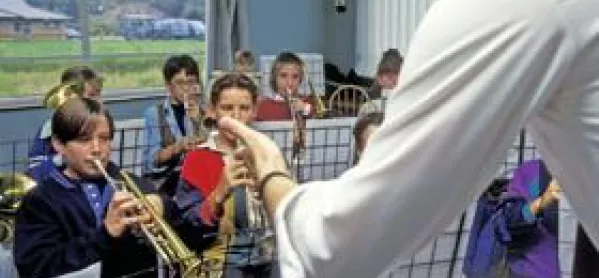Why not every hill is alive with the sound of music

Music lessons are under threat in dozens of Scottish schools as councils cut back on provision because of shrinking budgets, a new report has warned.
The document, published by the Instrumental Music Implementation Group (IMIG), urges local authorities to consider the benefits of music education before taking any decisions to cut funding.
The report notes that despite a commitment among a number of councils to maintain and even enhance their services in the current economic climate, “a growing threat [is] facing instrumental music services in several local authorities”.
The IMIG highlights the disparities among local authorities, both in terms of the provision offered and their policies on charging. Although some councils have scrapped fees altogether, others have increased them since the publication of a report from the Instrumental Music Group (the predecessor to the IMIG) in June 2013.
However, the latest report finds that in general good progress has been made on the previous group’s recommendations, and that there is now a “growing understanding and awareness” around the importance of instrumental music services.
It adds: “The evidence around the importance of music in learning and well-being is ever clearer, underlining music’s importance to a young person’s education as a whole.”
In light of growing financial challenges, the report proposes the idea of a National Music Education Trust. This could be a charity led by the private sector, also involving public and voluntary organisations. Although the report stresses that the idea is at a very early stage, group chair David Green told TESS: “I think there is a market out there.”
He highlighted the ways in which a trust could be helpful, such as in assisting talented young musicians to buy the expensive equipment needed to advance their learning.
The idea links to a recommendation in the 2013 IMG report, which called for a more proactive approach by local authorities in seeking external sponsorship for music provision at a regional or national level.
But this week’s report concludes that there could be significant challenges associated with sponsorship, meaning that opportunities “can be missed”.
The IMIG found that private sector organisations would welcome opportunities to engage with music education in their local areas, but that music services did not always have mechanisms in place to make the most of opportunities.
John Stodter, general secretary of education directors’ body ADES and a member of the IMIG, said that a national trust supporting music “would work and a lot of people would be interested”. “You would have a contribution from government and a contribution from sponsors and private companies, and you could have more involvement from people outside education,” he said.
Eileen Prior, executive director of the Scottish Parent Teacher Council (SPTC), said the huge diversity in provision was something that “animated” parents. However, she said that families had “different perspectives in different areas of Scotland and we take the view that it is not up to the SPTC to say what’s right or wrong”.
She added: “Parents in the area should be working with the local authority and their schools to define their priorities.”
With the publication of the report, the government also announced that the IMIG would be replaced by the Music Education Strategy Group, which would develop its proposals.
A Scottish government spokeswoman said: “We are considering the recommendations and the Music Education Strategy Group will begin work to take these forward.
“There is now better information about charging and concessions policy across all local authorities and a stronger, growing culture of collaboration and cooperation among organisations involved with instrumental music.”
For more on music in schools, see page 16
Keep reading for just £1 per month
You've reached your limit of free articles this month. Subscribe for £1 per month for three months and get:
- Unlimited access to all Tes magazine content
- Exclusive subscriber-only stories
- Award-winning email newsletters



